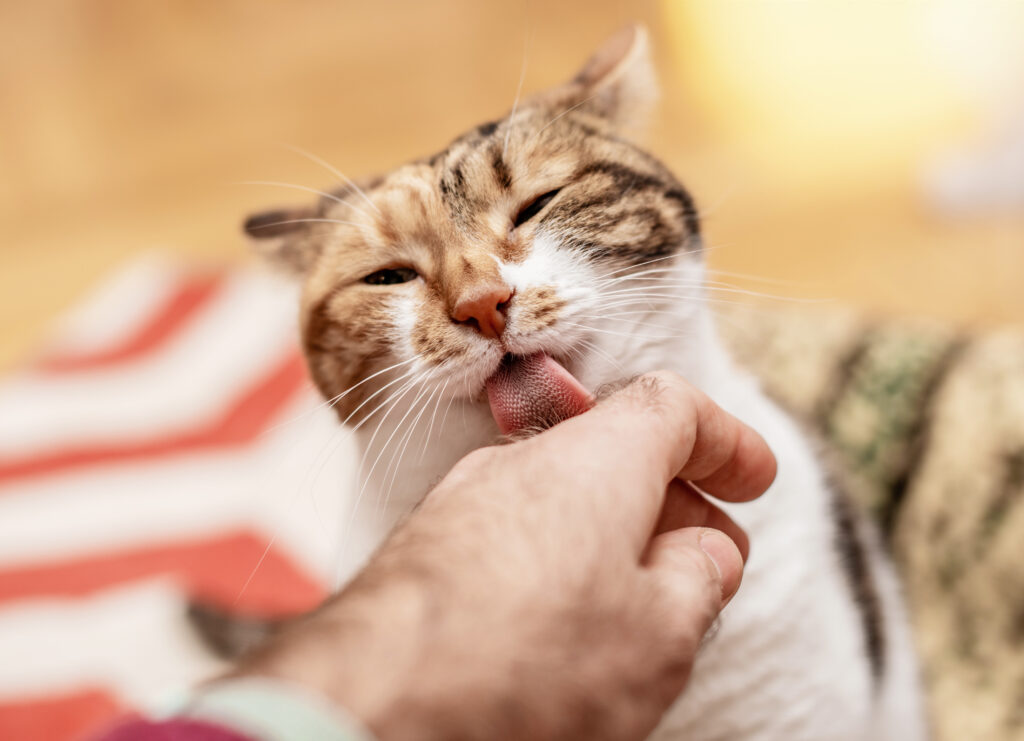Cats can be mysterious creatures, and their behaviors often leave us puzzled. One common behavior is when a cat licks you and then suddenly bites. Why do they do this? Knowing the reason can help you build a stronger bond with your feline friend. In this blog, we’ll explore why cats exhibit this behavior and what it really means. For more information or to make an appointment, call Arvada Veterinary Hospital in Arvada, Colorado at (303) 424-4439.
Understanding Cat Behavior
Cats have unique ways of communicating, and their behaviors can be quite complex. When your cat licks you, it’s often a sign of affection. Cats groom each other as a way of bonding, and by licking you, they’re showing that they care about you. However, the sudden bite that follows can be confusing. This behavior might seem contradictory, but it has several explanations.
Why Does My Cat Lick Me?
When a cat licks you, it is usually a sign of love and trust. Cats use grooming to bond with other cats and their human companions. By licking you, your cat is saying that you are part of its family. Licking can also be soothing for cats, much like how a human might find comfort in a hug.
The Sudden Bite: What It Means
The bite that follows a lick can be startling. This behavior is often a way for your cat to communicate that it has had enough interaction. Cats can be very sensitive to overstimulation, and what starts as a pleasant experience can quickly become too much for them. A gentle bite is your cat’s way of saying, “I need a break now.”
Overstimulation: A Common Trigger
Overstimulation is a common reason why your cat might lick you and then bite. Cats have different tolerance levels for petting and interaction. What feels good initially can become irritating if it goes on too long.
Recognizing Overstimulation in Cats
To avoid overstimulation, watch your cat’s body language closely. If your cat’s tail starts to twitch or its ears flatten, that’s a sign your cat is becoming overstimulated. Your cat might also start to turn its head away or look at your hand with wide eyes. If you notice these signs, it’s best to give your cat some space before it resorts to biting.
Play Aggression: Another Explanation
Sometimes, the lick-then-bite behavior is a form of play aggression. Cats are natural hunters, and they use play to practice their hunting skills. Licking can be part of the grooming ritual, but a bite can indicate that your cat wants to play. This type of behavior is more common in kittens and younger cats who have a lot of energy to burn.
Channeling Play Aggression
If play aggression is the reason for your cat’s behavior, providing them with plenty of toys and interactive playtime can help. Toys that mimic the movement of prey, like feather wands or laser pointers, can be particularly effective. Regular play sessions can help your cat release energy in a healthy way, reducing the likelihood of aggressive behavior toward you.
Redirecting the Behavior
Understanding why your cat licks and then bites is the first step to addressing the behavior. Redirecting your cat’s attention to toys or other activities can help reduce its chances of biting. For example, if your cat starts to lick you, gently move its attention to a toy. This can help satisfy your cat’s need for interaction without leading to a bite.
Tips for Redirecting Your Cat’s Attention
Here are some tips to help redirect your cat’s behavior:
- Keep a variety of toys handy to engage your cat.
- Offer treats as a reward for playing with toys instead of your hands.
- Use positive reinforcement to encourage desirable behavior.
- Spend time each day playing with your cat to keep it mentally and physically stimulated.
Stress and Anxiety
Stress and anxiety can also cause your cat to exhibit strange behaviors, including licking and biting. Changes in the environment, new pets, or even a change in routine can stress a cat. When stressed, a cat might lick you for comfort but then bite because it feels overwhelmed.
Helping Your Cat Manage Stress
To help your cat manage stress, create a calm and stable environment. Provide hiding spots where your cat can retreat when it feels anxious. Regular routines and positive interactions can also help reduce stress. If your cat’s behavior continues, consider consulting your veterinarian for further advice.
When to Talk to a Professional
If your cat’s licking and biting behavior becomes a concern, it might be time to seek professional help. Persistent aggressive behavior can sometimes indicate an underlying health condition. Your veterinarian can rule out any medical problems and guide you in managing your cat’s behavior.
Professional Advice for Cat Behavior Issues
Consulting your veterinarian or a professional cat behaviorist can provide you with valuable insights. They can help you understand your cat’s unique needs and offer strategies to improve your interactions. For more personalized advice, call Arvada Veterinary Hospital in Arvada, Colorado at (303) 424-4439 or schedule an appointment online.





